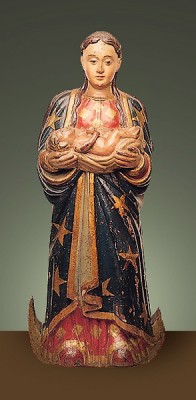 Nossa Senhora do Bom Parto, século XVII. Museu de Arte Sacra de São Paulo, Brasil
Nossa Senhora do Bom Parto, século XVII. Museu de Arte Sacra de São Paulo, Brasil
Scripture: Lectionary 318. Hebrews 10:1-10. Psalm 40:2.4.7-8.10.11. Mark 3:31-35:
We may wish to read the following Scriptures before looking at the Gospel of Mark for this day. They will give us an insight into the fact that Jesus and his mother are both Jews. They also form a background for understanding the graced relationship of Jesus with his mother Mary of Nazareth.
…for my family, my kin of the flesh: Israelites they are, and to them are due the sonship, the glory, the covenants, the giving of Torah, the worship, the promises; of them were the patriarchs, and from them is the messiah in the flesh—who is over all, and whom God blessed forever…for the gifts and the calling of God are irrevocable. ( St. Paul, in the Letter to the community in Rome, 9:3-5; 11:29).
And from a contemporary Jewish commentary on Mark 3:31-35: “New religious movements often create “fictive families”of social networks outside of traditional families, with members called “brothers and sisters,” “saints,”and so on.”
The reading from Mark does focus on Mary and “the family” coming to see Jesus who is within a house. The words that are important for a Marian perspective are these, “Whoever does the will of God is mother to me.” Mary is the only mother Jesus could speak of in his life. Her name will soon be given for the first time in Mark’s Gospel (Mark 6:3) who will identify Jesus as the “son of Mary.” Jesus has no other father in this first Gospel than God. Joseph is never mentioned by Mark.
Mary probably heard the words of Jesus and as usual reflected upon them. She was such a person who did not let words fall on unfruitful ground. She ponders (Luke 2:19, 52) over the words and events that she faces and on this occasion she intuits what Jesus is saying and has nothing to be ashamed of when it comes to doing the will of God. Her first experience at the Annunciation is a response to doing God’s will and this oriented the rest of her life. It was a graced moment that this woman, the mother of Jesus, would never forget. It guided her whole life with Jesus and kept her following her son through his stages of life even thought they were so short—some thirty years. She knew she had responded with a “yes” to Gabriel: “May it be done to me according to your word.” She knew that “nothing is impossible with God” as the angel informed her. She, as St. Augustine says, first conceived Jesus through faith, then through her very flesh. Both her son Jesus and she would continue to do God’s will throughout their lives.
Mark’s lesson is not a put down on Mary. It is meant for us. Jesus is telling us that blood relationship is not necessary to be one with him in doing the Father’s will. Both Jesus and Mary realized their relationship went beyond blood ties and “family.” She always waited for Jesus and found him. She searched for him in Jerusalem; she was there with him at Cana, and she stood next to his cross as he poured out his blood taken from her at conception and now given for the forgiveness of our sins—the sins of not doing the Father’s will. She alone knew every fiber of his being. Who else was there when he came into being through her conceiving of him? Who taught him how to pray, to go to the Temple for the feasts, to be at home in the synagogues? And who else but she heard his last words on the cross, “Woman, behold your son.” This was the beginning of the Christian community and she would be the Mother of the Church just as she was the mother of the Lord. No wonder she sings out daily through our voices ,“My soul proclaims the greatness of the Lord. My spirit rejoices in God my Savior (Jesus). Amen.
Copyright 2013 Fr. Bertrand Buby, S.M.
About the Author

Guest
We welcome guest contributors who graciously volunteer their writing for our readers. Please support our guest writers by visiting their sites, purchasing their work, and leaving comments to thank them for sharing their gifts here on CatholicMom.com. To inquire about serving as a guest contributor, contact editor@CatholicMom.com.


.png?width=1806&height=731&name=CatholicMom_hcfm_logo1_pos_871c_2728c%20(002).png)
Comments